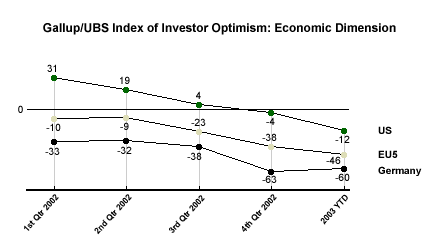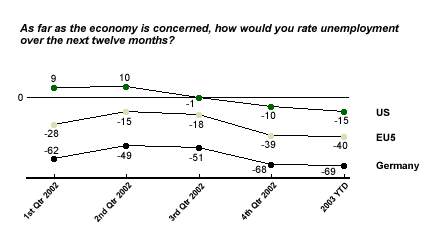The onus is on the American economy to lead a global recovery in the post-boom world. While the International Monetary Fund (IMF) predicts a global recovery in 2003 with a GDP growth forecast of 3%, the second- and third-largest economies in the world continue to drag their feet. Japan has still not recovered from the stock market crash of 1989, and three recessions later, remains in a deflationary trap. Germany's economy is slated to grow even more slowly than Japan's this year, and the latest UBS/Gallup Index of Investor Optimism only underscores how grim the outlook is for Germany and the rest of Europe.
The Index of Investor Optimism -- EU5*, which explores investor optimism in five major European countries (Great Britain, Germany, France, Spain, and Italy) -- has been declining persistently since the first quarter of 2002. For this story, Gallup combined data from surveys taken in January through April 2003 and compared the results for Germany, the United States, and the EU5 countries combined. Most striking in our analysis is the level and magnitude of the decline in optimism in Europe as compared to the United States. Within the EU5, the degree of pessimism about economic prospects among German investors is unmatched by that of investors in any other country.
Recession Redux
On May 15, the Bundesbank declared that Germany's economy contracted by .2% in the first quarter of 2003. On the back of a .03% decline in the fourth quarter of 2002, Germany is now technically in recession. Given the poor numbers on the Ifo Business Climate Index (a key German economic indicator), declining industrial production, and weak consumer demand, it is not surprising that investor optimism is far bleaker in Germany than in the EU5 as a whole, or in the United States. The Economic Dimension of the Index, which measures investors' assessments of their national economies, stands at -60 for Germany, compared to -46 for the EU5 and -12 for the United States. These numbers confirm that the German economy has dipped back into recession and could revisit the lows of the second half of 2001.

Agenda 2010
German Chancellor Gerhard Schroeder, in his March 14 address to the German Bundestag, called on the nation to summon the courage to reform, declaring the German labor markets the "least developed in Europe," and underscoring the need to address labor market rigidities. Yet even as Schroeder threatens to quit if the reforms do not go through, it is becoming increasingly evident that the politics of a coalition government will prevent serious structural reform of labor markets in the country. And with German unemployment at 10.7% in April, registering an increase for the 13th month in a row, it's clear that labor market reform is key to keeping Germany out of recession.
If one subtracts the percentage of pessimistic responses from the percentage of optimistic responses to the Gallup/UBS question on how the unemployment situation will play out in the economy in the next 12 months, it appears that sentiment in both Europe overall and the United States is downright negative. But the margin of pessimism in Germany (-69%) is far worse than the margin of -40% in the EU5 and -15% in America. Clearly, German investors seek the very labor market reforms that unions are protesting.

The Next Japan?
Inflation in Germany has been falling steadily and at 1% in April is nearly half the 2% average for the Euro zone. Considering Germany has the highest real interest rates in the Euro zone, and the European Central Bank (ECB) has been slow to shift its anti-inflation bias, Germany could be courting deflation.
Last month in its World Economic Outlook, the IMF pointed out how a weak banking sector and rising corporate bankruptcies in Germany are colluding to create a situation reminiscent of the collapse of the Japanese markets. When we polled Germans on their views on how inflation will play out in the next 12 months, subtracting the pessimistic responses from the optimistic responses, we found the margin to be an overwhelmingly negative -30. As the ECB mulls over what to do next, German investors see a central bank slow to cut rates in the face of increasing deflationary risks.
Bottom Line
German sentiment on key dimensions of the UBS/Gallup Index of Investor Optimism – EU5 has been increasingly pessimistic. With policy-makers slow to provide monetary or fiscal stimulus and political leadership that has not been able to effect credible structural reform, the outlook for the German economy remains weak. And with poor prospects for Germany, faltering U.S. markets, and a long-ailing Japanese economy, the question is --who is going to lead the global recovery?
*Results for the Gallup/UBS Index of Investor Optimism -- U.S. are based on monthly interviews with about 1,000 U.S. investors, aged 18 and older. Results for the Index of Investor Optimism -- EU5 are based on monthly interviews with approximately 200 investors each in France, Germany, Great Britain, Italy, and Spain. In addition to sampling error, question wording and practical difficulties in conducting surveys can introduce error or bias into the findings of public opinion polls.

